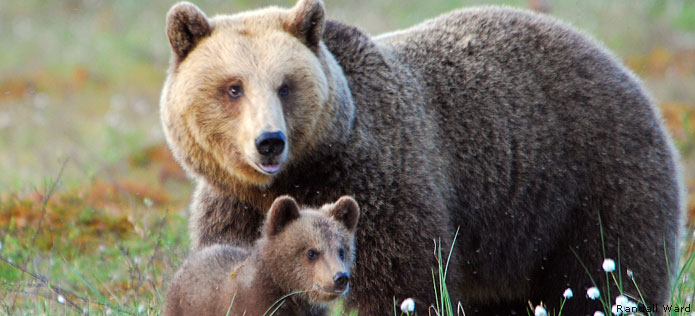
Here are some essential tips for staying safe while visiting bear country.
What You Do
- Where Should I Keep Food?
- Don’t leave pet food or garbage in areas where bears could get it. Place garbage in a heavy-duty, tied bag. Put the bag inside a garbage can with a bear-proof lid. Keep the can in a locked garage, away from doors and windows. Put it out just before the time of collection. Don’t leave it out overnight.
- Feed pets indoors. Or if you can’t do this, feed only as much as can be eaten in one meal.
- Keep recycled containers, such as soft drink cans, indoors. Sweet smells from them can attract bears if kept outdoors.
- Bird feeders attract bears. Hang them at least 10 feet high and 4 feet away from the nearest tree. Use a rope and pulley to refill them. Clean up seeds that spill on the ground.
- Beehives attract bears. If you have hives, put them up high on bear-proof platforms
- What Should I Do If a Bear Comes Into My Yard?
People should not let a bear stay in their yards or feed near their houses, garages, barns, or sheds. From a safe location try beating a metal pan with a spoon until the bear leaves. If the bear gets really close to your house, an adult could try spraying it with pepper spray from a secure location. (But be sure the wind is blowing in the right direction.) If a bear won’t leave, or if it has found food at your home, contact the state fish and game department. - How Should People Visiting Bear Country Behave?
Bears are often afraid or nervous around people. They usually avoid us. Very rarely bears may threaten or attack people, especially when surprised or when forced to defend themselves, their cubs, or their food. You should be careful to avoid all bears. Here are some specific tips:- Make noise: Let bears know you’re there by calling out, talking loudly, clapping your hands, or singing. Some people wear special “bear bells” but these may not make enough noise.
- Travel in groups: Groups are noisier and there is safety in numbers. Never let children wander away from the group.
- Keep your dog on a leash at all times or leave it at home. An unleashed dog may cause a bear to chase it. The dog may run back to you with the bear in tow.
- Stick to worn paths and trails and hike during the day, not at night.
- Watch for bears or for signs of them, including tracks, droppings, torn-up logs, scratched tree trunks, or overturned rocks. Leave the area if you see fresh signs of bears. Don’t camp there.
- Keep food (including toothpaste, gum, and candy) and food smells away from bears. Store your food in airtight bags in your backpack and hang it high between trees, 15 feet off the ground. Change your clothes after you’ve eaten dinner and put your old ones in the car–you don’t want to smell like a meal. Don’t bury or leave any garbage behind. If you catch fish don’t leave bits of it on the ground. Throw fish parts into the stream or lake.
- Avoid areas where you spot possible bear food. If you come across large, dead animals, leave the area immediately. If you’re in a park, tell a park staff person of this and of any other possible bear sightings or signs you spot.
- What Should I Do If I Meet a Bear in the Wilderness?
- Keep calm. Most bears don’t want to attack you. If a bear rears up on its hind legs and waves its nose about, it’s trying to identify you.
- Talk calmly. Don’t scream. Let the bear hear your voice. This lets the bear know you are human and not a prey animal.
- Never run or make a sudden movement. Bears can outrun you.
- Back off slowly and leave the area, or wait until the bear moves away.
- Leave the bear an escape route.

